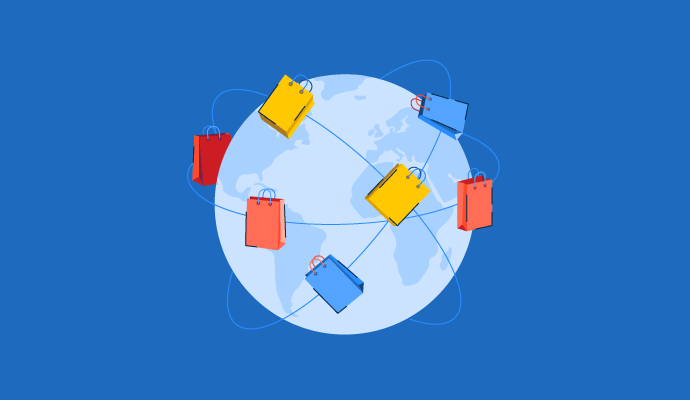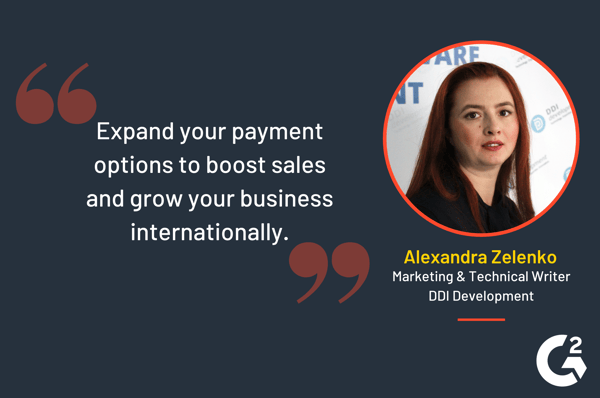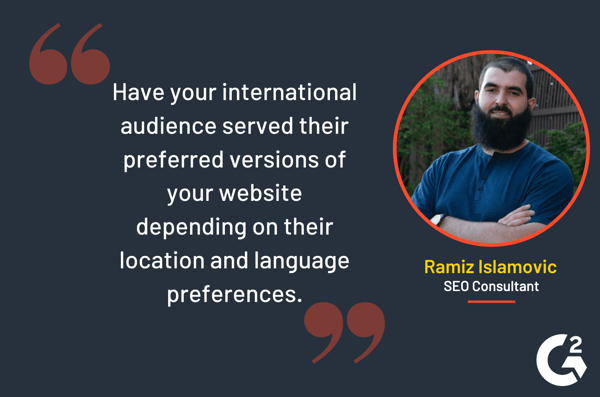July 23, 2019
 by Deirdre O'Donoghue / July 23, 2019
by Deirdre O'Donoghue / July 23, 2019

Looking for a simple-ish way to gain customers?
Take your e-commerce website to the international level.
Don’t believe me? Only 1% of the 30 million companies in the U.S. sell internationally, so there is an untapped market out there for the e-commerce industry.
Think about it – it’s very difficult for a brick-and-mortar store to expand globally, but since e-commerce businesses are online, it’s much more realistic for these companies to ship goods overseas.
Selling globally can be a bit intimidating, but take it from those who’ve already been there. These 10 tips from e-commerce pros will help you take your business from a local level to an international level.
There are a lot of details that go into expanding internationally. You have to consider how each country, and even each city, do business. You can’t go into another country doing the exact same thing you’re doing at home.
Learn from those who are experts in this field and apply their insight to your strategy when trying to expand globally.
“The primary focus is to hire a diverse marketing team that can define and understand each international target market. You'll then need to discover the various types of media your audience uses. VKontakte, for example, is an extremely popular social media platform in Russia while QZone is popular in China.

More and more competitors are expanding their online presence around the globe. International e-commerce allows companies to compete for new sales, diversify themselves, recruit new talent and of course, generate more revenue. You automatically grow your customer base once you start. Gaining a valuable presence in foreign markets would further improve the company and add additional sales opportunities.”
- Monica Eaton-Cardone, Co-Founder & COO at Chargebacks911“When scaling up your advertising campaigns to international clients, be sure to do a geographic source report in Google Analytics. This will show you quickly where you are receiving revenue organically from different countries. Do not go globally immediately and perhaps even start by retargeting individuals in those countries. This will help maximize your ad spend without throwing it away frivolously. It’s important to advertise to these locations because they are largely untapped and often ignored.”
- Ethan Herber, Head of Marketing and Advertising at WP Codeus“Consumers in different markets prefer different payment methods. That’s why you should allow customers to make payments through their preferred payment options in order not to lose those sales. In fact, 86% of China shoppers prefer digital payment methods such as Alipay while 66% of US consumers opt for credit cards. As you can see, every country is different. So, expand your payment options to boost sales and grow your business internationally.”

- Alexandra Zelenko, Marketing & Technical Writer at DDI Development
TIP: Explore payment processing software so you can choose the right payment option for each business location.
“Professionals looking to take their business international should sell their products on a site like Amazon. Amazon’s global reputation means that professionals will have a built-in customer base for their product and won’t have to start from scratch. Amazon also has several protection programs for sellers – including brand registry – that help sellers protect their brand and product. In today’s e-commerce landscape, having a presence on Amazon is essential for companies looking to grow their online sales.”
- Ethan McAfee, Founder of Amify
TIP: Start expanding your business and learn how to sell on Amazon, today.
“Connect your e-commerce product feed to popular shopping networks/channels to gain maximum exposure at a minimal cost. Google Shopping, Bing, and apps like AdRoll and Channable are all great tools. Automatic feeds are usually not automatically fed, though so be prepared to either manually resolve feed set-up issues or hire a pro to fix and activate them.
There are often markets overseas that may be more interested and/or willing to buy products than domestically. As long as you have a means of protecting your profits against currency conversions, custom duties, shipping costs, etc., it's a lucrative way to scale an e-commerce business faster than just selling at home.”
- Ethan M. Segal, Founder & CEO of Segal & Co Digital Marketing“Showing up in the organic search results in any given country is critical, and given Google's global reach, it's a no brainer for any international e-commerce site.
The best place to start would be to begin translating all of your core product and conversion-driven landing pages. Next, you'll want to implement Hreflang tags. These HTML tags tell Google which version of your web pages you want to show up in any given location (and language).

The end result is to have your international audience served their preferred versions of your website depending on their location and language preferences.”
- Ramiz Islamovic, SEO Consultant
Tip: Explore the ultimate guide to digital marketing to improve your business ROI.
“Over the years I have worked with many e-commerce companies that have gone international and one of the first issues they run into is the location of the manufacturing plant. The advice I would give to those looking to expand is to open another location for manufacturing that will make it easier to ship internationally. This especially true for those companies who do not make their product in house. This will allow your product to remain low cost for those buying it overseas and allow you to stay competitive in those markets.
- Sean Dudayev, Founder of Frootful Marketing“The first step in growing and expanding your e-commerce business internationally is, of course, researching what markets are best for your business to expand in. Understanding your target market in other countries is a very important step in successfully expanding your business globally. You also need to consider shipping, taxation, and the economies in other countries. Marketing can also be tricky when looking to expand globally. The methods of delivery can stay the same, but the language barrier can be a tricky hurdle to overcome at first. Producing content in one language with other languages in the subtitles or captions could be a good way to go.
One obvious reason for wanting to scale your company globally is you have a much larger customer base and very diverse markets to sell your products in. If done right, your sales could greatly increase. The international consumer market is growing at a rapid pace. More and more people are shopping online than ever before and it is expected that this number will continue to grow. Selling internationally also eliminates the struggle of seasonal products. When a product is “Out of Season” in the United States it could be in season in another part of the world.”
- Andrew Maffettone, Marketing & Operations Director at Seller’s Choice
TIP: Learn how to ship internationally and why it's important so that you can launch a successful international e-commerce business.
“We recommend that companies perform market research prior to entering the international market. See who your current competitors are and research the demand for your products. You will also need to price products accordingly and packaging should be translated and marketed to consumers in that particular country. This may be an opportunity for you to rebrand your products. Learn more about the best supply chain companies around the world, like Coca Cola and Johnson & Johnson.
- Brian Sheehan, Sales Manager at Hollingsworth“E-tailing, like retailing, is all about getting ahead of the curve. Expanding internationally helps you gain cultural insights that can lead to breakthrough products. Yes, a new market expands your customer base, but even more than that, it expands your company’s thinking on what’s next in your industry. And, once you gain insight in one market, you can test that insight in additional markets. International expansion can be the catalyst for making your company a category leader.”
- Jennifer Wyne, Marketing & Communications at One World DirectExpanding beyond your home country can be difficult. There are many working parts that together make for a successful e-commerce business expansion. Simply follow these tips and you’ll be ahead of 99% of U.S. companies.
Not sure if you want to sell on Amazon? Check out these Amazon statistics before you get started.
Deirdre O’Donoghue is a Content Manager at Nature's Fynd and a former Content Manager at G2. In her free time, you can find Deirdre fostering puppies or exploring the Chicago foodie scene. (she/her/hers)
Marketing, as always, is constantly evolving.
 by Vyshnavi Basuthkar
by Vyshnavi Basuthkar
As marketers, we know how critical it is to shape a brand experience that feels consistent and...
 by Soundarya Jayaraman
by Soundarya Jayaraman
When you're tasked with launching a new product, brand equity is your secret weapon. Whether...
.png) by Shreya Mattoo
by Shreya Mattoo
Marketing, as always, is constantly evolving.
 by Vyshnavi Basuthkar
by Vyshnavi Basuthkar
As marketers, we know how critical it is to shape a brand experience that feels consistent and...
 by Soundarya Jayaraman
by Soundarya Jayaraman


